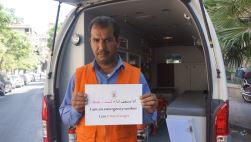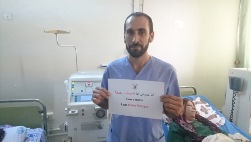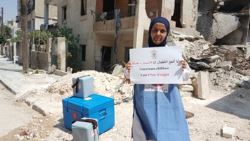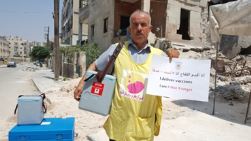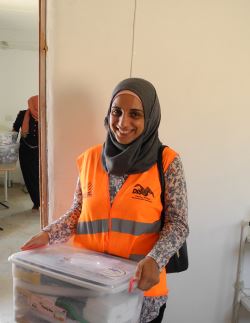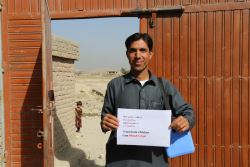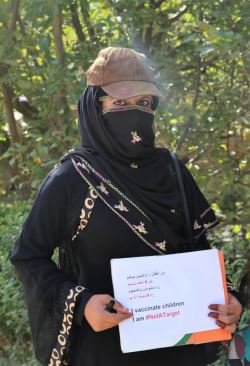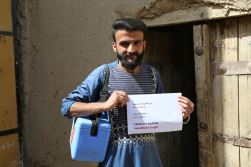18 August 2017 – Despite condemnations from WHO and health partners, attacks on health care in the Eastern Mediterranean have not decreased this year over last.
In the first 3 months of 2017, more than 152 attacks on health care were reported from 9 countries in the Region, compared to 57 attacks during the same time in 2016.
Behind these startling figures are real lives and real people. Every day, health workers in conflict settings face remarkable dangers and difficulties to provide care to those who need it most.
Thousands of health workers across the Region remain committed to the oath they took to save lives, sometimes knowingly risking their own lives as they refuse to abandon their patients.
World Humanitarian Day is time for us to stand with health workers, and show them that we are fulfilling our moral and human obligation to keep them safe.
Photo gallery
|
"Luckily, I survived," says Maher. "After 22 years as an emergency worker in the national emergency services, and after having undergone surgical operations for five months, I am back doing what I want to do: helping the injured and the misfortunate of this ill-fated conflict." |
“Although I am supposed to work 8 hours per day, I sometimes work for 17 hours per day to fill shortages in nursing staff,” he said. “I often see patients coming to our hospital because they are unable to find the medicines they need in other hospitals. It makes me sad and frustrated. While we get support from WHO-supported NGOs, we sometimes also collect money amongst ourselves to buy these medicines for the patients, despite our difficult financial situation. It’s the humane thing to do” added Yasser. |
|
“I have been vaccinating children in Aleppo for more than 15 years. I continued preforming my duties in different health centres in Aleppo due to escalating violence and intensified fighting in the area affecting the hospitals,” she said. “The recent improvement of the security situation in Aleppo has had a positive impact on the vaccination services, and I feel much safer here now,” Ibtisam added. |
“I fled with my family due to escalating violence in the area and I now deliver vaccines in the main health district in city of Aleppo,” said Hasan. “While eastern Aleppo city was besieged, we did our best to deliver vaccines to health facilities there; however, we failed several times due to intensified fighting, lack of approvals from parties on the ground and the targeting of the health workers on several occasions,” added Hassan. |
|
“The work I do is very rewarding, not financially but emotionally. When I do my job, it gives satisfaction because I care about the people here. When I see that my patients are healthy and happy, it makes me happy. We don’t just give patients a health service, but we also provide the communities with a chance to discuss other problems they face as well.” |
 Raed Al-Shilleh from the West Bank in occupied Palestinian territory, is an ambulance worker with the Palestinian Red Crescent Society, where he has worked for the past 14 years. Ambulance and emergency aid workers in the West Bank confront substantial risks in the face of conflict. In the past, Raed has been attacked and verbally abused. "Working as an emergency practitioner and humanitarian aid person in Palestine is not easy. We face many obstacles and risks in reaching out to the people in need and in providing the support we are meant to provide. I won’t lie by saying that such incidents don’t scare me or I don’t care for my life. I do fear for my life, but at the same time, I can’t think of doing any other work either. This is a part of my identity.” Raed Al-Shilleh from the West Bank in occupied Palestinian territory, is an ambulance worker with the Palestinian Red Crescent Society, where he has worked for the past 14 years. Ambulance and emergency aid workers in the West Bank confront substantial risks in the face of conflict. In the past, Raed has been attacked and verbally abused. "Working as an emergency practitioner and humanitarian aid person in Palestine is not easy. We face many obstacles and risks in reaching out to the people in need and in providing the support we are meant to provide. I won’t lie by saying that such incidents don’t scare me or I don’t care for my life. I do fear for my life, but at the same time, I can’t think of doing any other work either. This is a part of my identity.”
|
 Mahmoud Almasri, from Gaza has been a volunteer paramedic at the Palestinian Red Crescent Society in occupied Palestinian territory for one year. While volunteering with the society, Mahmoud is also in the process of finishing his fourth year at Al-Quds Open University, studying health administration. Mahmoud is passionate about helping others and doing humanitarian work, and he joined the Red Crescent to make a difference in people’s lives. |
“I joined the vaccination programme because I want to serve our country and to see people protected from infectious diseases. The security situation is good in the area where I work, but unfortunately many provinces still suffer from conflict and insecurity, making immunization efforts more difficult,” he says. |
|
Zahra recently joined Afghanistan’s national vaccination programme and works as a volunteer vaccinator in Kabul. “I like my work and I am proud of what I do. I want to contribute to disease eradication efforts and help Afghan children grow up healthy,” she says. |
“Almost everyone in my area accepts vaccines when we offer them. If someone initially refuses, we convince them to vaccinate their children by giving them more information about the benefits of vaccination and why it’s essential for children’s health.” |


